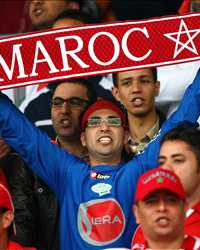January 29 – Morocco was today awarded the 2015 African Cup of Nations, defeating its only rivals South Africa, who will stage the 2017 tournament.
The countries were the only two biding for the 30th and 31st editions of the Cup of Nations after Congo withdrew from the race last year, meaning the only decision the Confederation of African Football (CAF) 15 man ruling Executive Committee meeting in Lubumashi, Congo, had to reach in which order Morocco and South Africa would hold the two tournaments up for grabs.
The bid teams made their final presentations earlier to the Executive Committee, under the chairmanship of President Issa Hayatou.
CAF also announced Morocco will host the 2013 Africa Under-17 Championship and Rwanda will stage the 2016 African Nations Championship.
Morocco convinced CAF this time after losing out to South Africa in a 2004 FIFA vote to host the 2010 World Cup – the first in Africa.
The north African country has hosted the African Cup once before, in 1988.
It won its only title in 1976.
Morocco has built new stadiums in Fes, Marrakech and Tangiers, adding to existing venues in Casablanca and the capital, Rabat.
South Africa’s bid team included World Cup Organising Committee chief executive Danny Jordaan, who was now a vice-president of the South African Football Association (SAFA).
South Africa has also hosted the African Cup once before, when it won in 1996.
“We would have liked to host the 2015 edition,” said Lesley Sedibe, the chief executive of the SAFA.
“But a decision has been taken and we have no problem with that.
“We made a presentation that we have the infrastructure ready as well as all the volunteers that worked during the FIFA Soccer World Cup to call on a short notice, but like we say, we welcome the decision as there was no losers.”
The Moroccans jumped with joy and hugged each other when the announcement was made, some even blowing vuvuzelas to greet the announcement.
Gabon and Equatorial Guinea had already been chosen as the venue for the 2012 African Cup. Libya will host in 2013, when it is moved to an odd year to avoid clashing with the 2014 World Cup.

